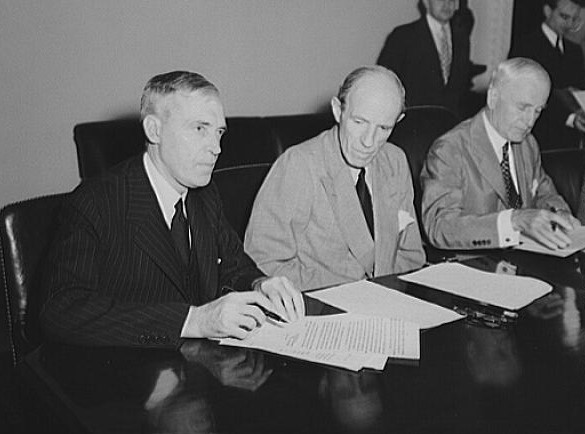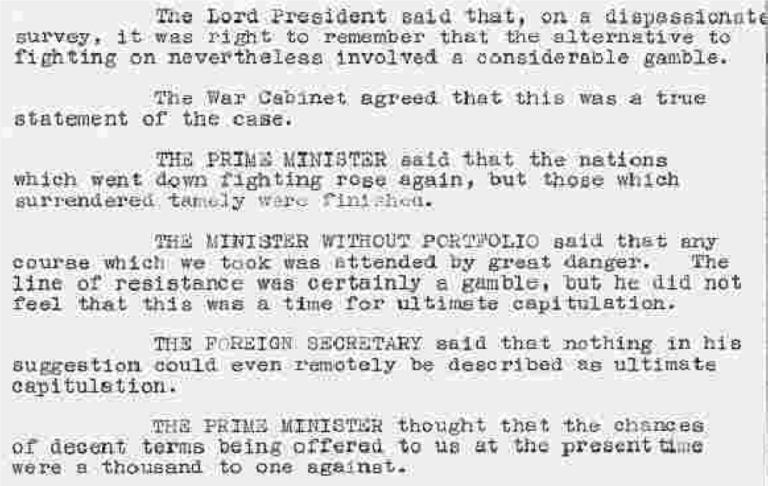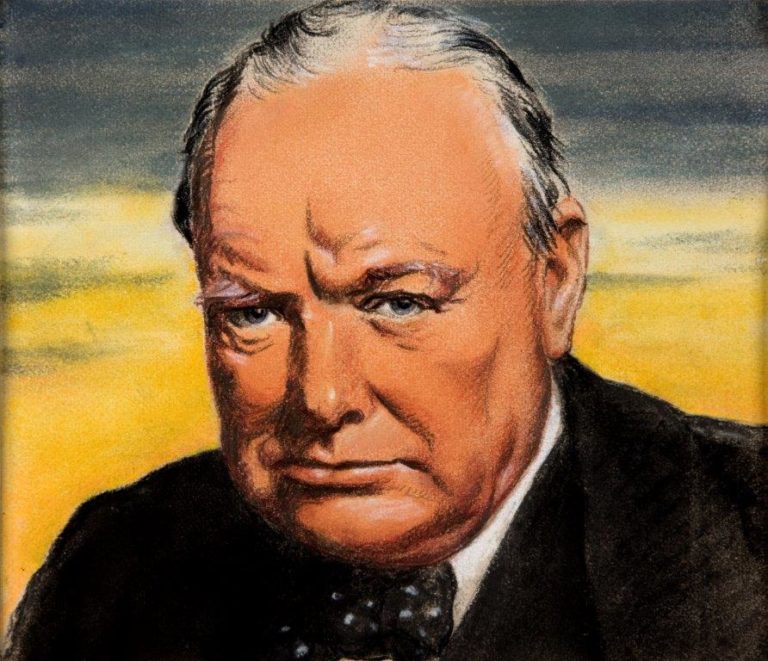Tuesday 28 May 1940 was one of the most significant days in the course of the Second World War in terms of the British government’s strategy, with the fate of the British Expeditionary Force at Dunkirk in the balance and the future of France (and, indeed, western civilisation) in severe jeopardy. This is the territory explored by the film ‘Darkest Hour’, in which Gary Oldman plays Winston Churchill.
Since 25 May the Foreign Secretary Lord Halifax had been pursuing, with increasing vigour, the possibility of a negotiated peace with Hitler through the services of Mussolini. The potential conduit for this was the Italian Ambassador, Giuseppe Bastianini. This caused significant tensions between Halifax and Churchill during the War Cabinet meetings of these eventful days, which had ebbed and flowed. Under tremendous pressure, and wary of Chamberlain’s position, Churchill had seemed to concede some ground to Halifax on a couple of occasions.

At a 14:00 War Cabinet meeting on 26 May, Halifax sought a commitment from Churchill regarding peace mediation: ‘If he [Churchill] was satisfied that matters vital to the independence of this country were unaffected, would he be “prepared” to discuss such terms?’
At this stage Churchill knew he could not give a categorical no. He said that he ‘would be thankful to get out of our present difficulties on such terms, provided we retained the essentials and the elements of our vital strength, even at the cost of some territories’. He added that he did not believe in the prospect of such a deal.
At the 17:00 meeting on 26 May, it is clear from Churchill’s response that he wasn’t at all keen on Halifax’s line: ‘The only thing to do was to show him [Hitler] that he could not conquer this country’ but he also said ‘he did not raise any objection to some approach being made to Signor Mussolini.’ – Churchill felt he had to make some concession to Halifax, at least momentarily.
Intense debate
At a War Cabinet meeting at 16:00 on 28 May, the differences between the two principal figures over the peace mediation proposal were laid bare as never before. The detailed account of this meeting available in the ‘Confidential Annex’ to the Minutes reads like a very fraught game of verbal tennis. Churchill was clearly rejecting the option of seeking mediation with Hitler through Mussolini’s services[ref]The French Prime Minister, Paul Reynaud, was hoping that the British Government would pursue the peace mediation option.[/ref]. Churchill was supported in his opposition by the Minister Without Portfolio (Arthur Greenwood, Labour) and the Secretary of State for Air, Archibald Sinclair (Liberal Party).
It is not really accurate to describe Halifax’s position as defeatist – he advocated an argument of cold logic, which could be paraphrased as ‘there’s no point in going down in a blaze of glory, and losing everything we hold dear, when we could secure a settlement before France goes out of the war that will leave Britain intact’.
The tension caused by the sharp exchanges at that meeting must have been palpable: the following extract gives a flavour of the robust debate.

CAB 65/13, WM (40) 145
When one reads Lord President of the Council Neville Chamberlain’s contributions, it is not easy to work out precisely what his position was. He does state that the message we should give to France is: ‘without prejudice to the future, the present is not the time at which advances should be made to Signor Mussolini’.
Halifax must have been disappointed to hear him say that. However, there seems to be, in my view, a lot of verbiage and a certain amount of ‘hedging’ by Chamberlain. He does not back Halifax’s view – and that was significant – and surely a relief to Churchill, who would have dreaded a Halifax-Chamberlain alliance on this matter. But Chamberlain does appear to be clinging on to the notion that there was no harm in hearing what the peace terms might be – whilst still making it clear that Britain would fight for its independence. It is a complicated balancing act he is trying to carry off.
Churchill makes his move
The deliberations continued a long time. At 18:15, Churchill made a very smart manoeuvre. He adjourned the meeting, to reassemble at 19:00. In the meantime, he had arranged to meet with the members of the Outer Cabinet in his rooms at the House of Commons.
The Second World War Diary of Hugh Dalton (Labour, Minister of Economic Warfare) includes a powerful account of Churchill’s address to those assembled: ‘He is quite magnificent. The man, the only man we have, for this hour.’
He quotes Churchill as saying [my heavily condensed version]: ‘if we tried to make peace now…we should become a slave state.’
According to Dalton, Churchill crowned his arguments with this incredibly passionate exhortation: ‘We shall go on and we shall fight it out, here or elsewhere, and if at last the long story is to end, it were better it should end, not through surrender, but only when we are rolling senselessly upon the ground.’ Dalton added an insertion in the margin of his Diary, giving an alternative version: ‘If this long island story of ours is to end at last, let it end only when each of us lies choking in his own blood upon the ground.’
Churchill got a fantastic reception for this speech. He must have been full of renewed vigour when he returned to the reassembled Cabinet meeting at 19:00. He immediately told his colleagues about the reaction of the Outer Cabinet Ministers who ‘had not expressed alarm at the position in France, but had expressed the greatest satisfaction when he told them that there was no chance of our giving up the struggle. He did not remember having ever before heard a gathering of persons occupying high places in political life express themselves so emphatically’.
Halifax knew he could no longer raise objections to Churchill’s ‘we shall fight it out’ strategy. The matter was settled. While there was still a colossal amount of sacrifice and suffering to come, the ‘darkest hour’ – a time when, unbeknown to the public, the unity of the War Cabinet was in doubt at a critical juncture – this hour had passed.

Postscript
In his book on the May 1940 Cabinet Crisis, Lord Owen makes a noteworthy and thought-provoking argument: ‘Halifax as Foreign Secretary was right to ensure in May 1940 that a negotiated peace was discussed extensively in the War Cabinet’[ref]Cabinet’s Finest Hour: The Hidden Agenda of May 1940, David Owen (Haus, 2016), p. 231 and see also p. 248.[/ref]. Given the high stakes, it was right that alternative courses of action to fighting on should have been examined and tested to destruction. Lord Owen makes a powerful point: the fact that there was a full Cabinet discussion was a healthy sign – democracy was maintained in the fight against authoritarian regimes.
Riveting reading. Both Churchill and Halifax were justified. I am so glad that this history is preserved
Churchill was indeed “The man of the hour”. Always great in oratory, and in clear and decisive thinking. We continue to owe him a great deal, in our freedom. Britons, with large and small boats, headed from the South Coast of England, to Dunkirk, to pick up thousands stranded on the beaches. Churchill had a good wife in Clementine.
MY FATHER WAS RESCUED FROM DUNKIRK ON 1ST JUNE 1940 HIS BATTALION 8TH BATTALION WORCESTERSHIRE REGIMENT 750 MEN WENT TO FRANCE IN JANUARY 1940. 149 OF THEM RETURNED.
I was 8 years of age when “The war broke out” & followed it through the medium of the wireless newspapers particularly the Daily Herald & the magazine Picture Post. So I found the archive very interesting it gave me the official wording of the pre Dunkirk discussions. I lived in Grimsby during the war so boats & ships were always to the fore in conversations about incidents & happenings that took place.
Peter
Yes and had Hitler not been forced to stay his hand on a start to Operation Sea Lion (the sea borne jnvasion of Britain…for which he had seized 1183 small ships and barges) and while the Battle of Britain was being won thanks to the RAF with the loss of 81 fighter aircraft the whole disaster of Dunkirk may have been an even bloodier and uncertain outcome. And the reason he stayed his hand ?…and missed the vital cut-off point for a start, start no later than high summer, September 1940. The failed start to Sea Lion was due the delay and ultimate failure by attempts by Ribbentrop to extract the abdicated King Edward, aka The Duke of Windsor, (whom Hitler had plans to reinstate as King, safely out of Portugal and into Franco’s Spain, where he could be controlled and safe, if needed, for further usage).
Churchill was correct. And also correct too in his insistence that Edward be exiled to the Bahamas for the duration.
My father was killed at Dunkirk,I am glad he gave his life for a worthy cause and did not waste it
As Henry Matthews says, riveting reading.
I am no warmonger, far from it, but Churchill’s view was the right one, as can be seen with the support of the members of his outer Cabinet as reported here
As Hitler did not wish to crush the British Empire, Churchill could have secured and advantageous peace in 1940 that would have prevented bankruptcy, dependence on the Americans, a disorderly liquidation of the British Empire and Sovietization of eastern Europe. Countless lives might have been saved, including those of many of the European Jews who were liquidated. This would have been at the cost of German hegemony over Western and Eastern Europe.
It is commonly thought that the Dunkirk evacuation saw the return of all BEF personnel from France.
This not so. Many personnel –Army and RAF were stranded in the the west of France. My father was in RAF ground crew. After Dunkirk he and many others made their to the west coast ports of France.
He among others marched many miles to St Nazaire via Nantes. On the “march ” mixed in with French civilian refugees. He saw these people strafed and bombed by the Luftwaffe-leaving him with memories that never left him.
As he left St Nazaire on the 17th June 1940 he sawthe linerSS lancastriabimdedand sunk with the loss of 5000-7000 lives–service personnel and civilian refugees. Churchill ordred the Lancastria sinking kept quiet and it slipped out of common memory.
My father finally got safely to Plymouth on a listing mercahantman –the SS Floristan.
The west coast evacuations were carried out under the umbrella of “operation ARIEL”.
In all 250,000 men were saved by the end of August in that west coast evacution. Smaller numbers were evacuated from the Brittany and Normandy coast.
I have told my fathers story -there are many more .
Idi not wish to denigrat thepic of Dunkirk -I merely in my humble way wished to point out that Dunkirk was not the end of the story-a great part but not all of it.
If, as Mr Anwar says, Hitler did not wish to crush the British Empire, it was only because his fits intend had been to overrun the Soviet Union which he would have failed to do whether UK was “crushed” or not. Thus not only EASTERN Europe but much if not most of WESTERN Europe would have been, too. Does he really believe that UK could have sat back and watched a Soviet naval base on the French Atlantic coast?
According to the film The Darkest Hour, Churchill yelled at Lord Halifax, “Don’t interrupting me while I’m interrupting you?” Did he actually say this sentence?
This was probably a scripted comment – it does not appear in the minutes of the 1940 Cabinet meetings.
Although the British military establishment has never publicly acknowledged the King Leopold III and his army, by their prolonged resistance saved the BEF, the world famous military expert Liddell Hart saw no reason for such reticence.
In 1960 delivering a lecture to students and faculty at King College.
Liddell Hart bluntly declared “ The British army at Dunkirk was saved from destruction by King Leopold III of the Belgians.
Captain Liddell Hart said that Sir Arthur Bryant’s claim that the saving of the BEF was mainly due to Lord Alanbrooke did not stand up to examination.
Hart went on to say, “ the unfortunate Belgian Army absorbed the weight of the German frontal attack from the north. By the time the Belgian front had turned the BEF had slipped out of reach and were nearing Dunkirk.
Liddell Hart went further to say, “ if King Leopold III had left Belgium on May 25th as his ministers and Churchill had urged him to do so. The Belgian army would have surrendered immediately, instead of fighting on until early morning of May 28th.
IF SO, THE BRITISH WOULD HAVE HAD VERY LITTLE CHANCE OF ESCAPING ENCIRCLEMENT, SO THAT IT COULD VERY REASONABLY BE CLAIMED THAT THEY WERE SAVED BY KING LEOPOLD III, WHO THEN WAS VIOLENTLY ABUSED BY BRITON AND FRANCE “
Reply